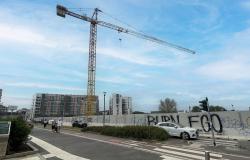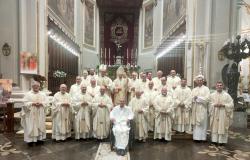The G7? «Six lame ducks and Giorgia Meloni»: this is the dry definition of «Politico», a respected American digital newspaper. And indeed, lamenesses abounded around the olive wood table: Macron and Scholz crippled by the recent elections, Sunak crippled by the next ones, Joe Biden and Fumio Kishida with very low popularity ratings, and Trudeau struggling with a government of minority. And Giorgia Meloni? The only one not limping… But a G7, despite its limps, and with a weight of more than 40% of world GDP, can still churn out significant decisions. Before talking about these, we must point the finger at something unique in the history of these assemblies. A pope had never participated in the G7, and this time he did so, albeit limited to the topic of AI (Artificial Intelligence), which was the subject of a special session of the summit. There is an abundant literature on the dangers of AI as well as its potential advantages, but naturally, given the ethical implications, Pope Francis focused on the dangers: «A fascinating and tremendous tool», is the title of his speech (The full text is available at https://www.vaticannews.va/it.).
The stakes
Given that all the progress of science has always found a military application, that is, used to exacerbate and not to alleviate the suffering of humanity (“When our ancestors”, says Francis, sharpened flint stones to make knives, they used them both to cut leather for clothes and to kill each other”), the Pope immediately set limits, asking as already happens with chemical and bacteriological weapons to ban the use of “lethal autonomous weapons. No machine should ever choose whether to take the life of a human being.” The famous “Three laws of robotics”, by Isaac Asimov: «1- A robot cannot cause harm to human beings, nor can it allow human beings to suffer harm due to its failure to intervene. 2- A robot must obey orders given by humans, unless such orders conflict with the First Law. 3- A robot must safeguard its own existence, as long as this does not conflict with the First and Second Laws.” Asimov then added, years later, the “Zero Law”, for use by the most sophisticated robots: «A robot cannot cause harm to humanity, nor can it allow humanity to suffer harm due to its failure to intervene» . The first example of malicious AI was in the famous film “2001: A Space Odyssey”, when the killer computer was finally neutralized by pulling the plug. Precautions for current AI, more than half a century after the 1968 film, will have to be more sophisticated, but Francis wants limits that go beyond murder: «We would condemn humanity to a hopeless future if we took away people’s ability to decide about themselves and their lives, condemning them to depend on the choices of machines”. Ultimately: “We need to guarantee and protect a space for significant human control over the process of choosing artificial intelligence programs: human dignity itself is at stake.” And the final G7 statement largely reflected the Pope’s warnings and concerns.
Perhaps the most popular measure of the G7 (a summit in its 50th edition) was that on Ukraine, and more particularly on how to implement a transfusion of financial blood for a country that has to bear enormous war costs to defend itself, and repair the immense devastation from Russian bombing.
The Russians
The “financial blood” used is, as it should be, Russian blood, that of Russian assets frozen in the West. The story begins with Mario Draghi who, in the aftermath of Putin’s invasion, suggested to US Treasury Secretary Janet Yellen to place a restriction on the activities of the Russian Central Bank. It is about 300 billion dollars: most of it held in Europe (70%, at Euroclear) and the rest in the USA and Great Britain. Just confiscating Russian funds seems like a violation of international law, and many, starting with the usual Germans, fear that a precedent will be created. It is feared that no one will place their funds in trust if they can be confiscated by hostile parties. However, there are legal opinions that say how a violation of international law (invasion of a sovereign country) can justify a payment of reparations to the invaded with the invader’s funds (the damage to Ukraine is estimated by the World Bank, to date, in approximately 480 billion dollars). Then there is the solution of using only the proceeds (interest and dividends) from the frozen assets to support Ukraine. But there are those who say that it would be permissible to only use unexpected proceeds and not normal ones. Finally, there are more complicated solutions: those of issuing bonds guaranteed by Russian assets and assigning the funds raised to the Ukrainians. Basically, this is the solution approved in Borgo Egnazia. The money is raised on the market and the debt is serviced with interest and dividends from frozen Russian funds. The money is given as a loan to Ukraine which will have to repay it one day. But it is assumed that at the end of the war Russia will have to pay reparations to Ukraine, and Russian collateral assets will serve this purpose. The solution found will trigger legal challenges (“A theft!”, the Kremlin spokesperson has already said). But Sandro Pertini would have had no hesitations: «A bandit, a bandit and a half!», was his motto during the Resistance. Also very important is the “historic pact”, as Zelensky defined it: a bilateral pact of mutual assistance between Ukraine and the United States, which goes beyond the agreements on military aid and prefigures an increasingly close collaboration between an invaded country and the world’s leading military power. Russia wants to exhaust the West and the West wants to exhaust Russia: the historical pact is another link in the tragic game of “who will blink first?”. And meanwhile Ukraine sees more deaths and more devastation. .
© ALL RIGHTS RESERVED
Read the full article at
The morning





